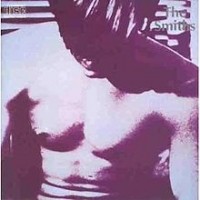
The Smiths
The Smiths (1983)
tdog52436
With their self-titled debut, the Smiths introduced themselves to the world as a band that simply could not be ignored. Nobody sounded like them. What singer in their right mind would croon and wail like Morrissey? This is rock ân' roll, not dramatic theater. What band writes songs about loneliness, child murders andâ¦gay sex? Those aren't very manly things to sing about, are they?
Well, The Smiths didn't care. Their first album was the music they wanted to make, made on their own terms. Does it succeed? Most of the time.
The first song, "Reel around the Fountain," is slow, pretty and elegant. As Morrissey smoothly croons, "Fifteen minutes with you / Oh, I wouldn't say no," you can't help but admire the stately beauty of Johnny Marr's guitar arpeggios. The songwriting duo of Morrissey and Marr fit like a hand in a glove, appropriately enough for a band whose first single was called "Hand In Glove." That song, which fuses Beatles-esque harmonica and pop smarts with viciously satirical anti-love lyrics like "The sun shines out of our behinds / No, it's not like any other love / This one is different because it's us," effectively sets the tone for this album. It's track nine of 11, coming smack in the middle of a run of four perfect singles: "This Charming Man," "Still Ill," "Hand In Glove" and "What Difference Does It Make?". For that four-song stretch, the Smiths fulfill the potential they only hint at on the rest of the album.
"This Charming Man" is everything the Smiths do well--astonishing guitar riffs that flows like water, melodrama from Morrissey in the vocals, witty (and very British) lyrics and a super-competent rhythm section. It's the song that got me hooked on this band, and a pretty good test to see if you would like them yourself. "Still Ill" is both catchy and political, yet in that intensely personal way that every Smiths song can't help but be, while "What Difference Does It Make?" shows off Morrissey the scorned lover at his most sharply sardonic, while Marr's guitar leaps nimbly through the darkness. Would that the rest of the album was this good.
"You've Got Everything Now" has an almost anthemic chorus, sounding more traditionally pop-rock than the Smiths would ever dare to venture again. It works, as does the mellow yet ominous chill of "Pretty Girls Make Graves." On the rest of the album, however, the band plays too slow and pretty for its own good. "The Hand That Rocks The Cradle," "I Don't Owe You Anything," "Suffer Little Children;" they're all pleasant enough, but for a band destined for greatness like the Smiths, pleasant just won't cut it. Then there's "Miserable Lie." This one starts out kind of boring, then speeds up to a faux-punk gallop (The Smiths may have listened to lots of punk when growing up, but that doesn't mean they could or should have played punk rock), with Morrissey slathering his fey falsetto all over the outro. This falsetto is used to better effect on "What Difference Does It Make?", though after this album, Morrissey made the wise decision to retire this awkward vocal gimmick and stick to developing the expressive croon that would become his signature, inimitable style.
The Smiths probably shouldn't be the first Smiths album you try. The band was still growing and had yet to diversify its sound, as it would skillfully do on later releases like Meat is Murder or the masterpiece, The Queen is Dead. Still, once you're a fan (and if you give the Smiths a fair shot, trust me, you will become a fan), definitely pick this album up. You'll grow to love a lot of the songs on it, and though it has its flaws, you can still listen to The Smiths and enjoy it from start to finish.